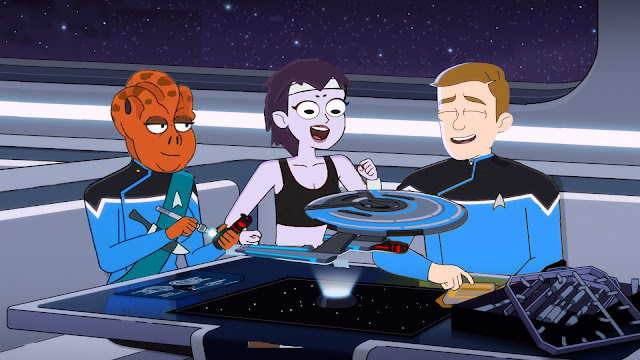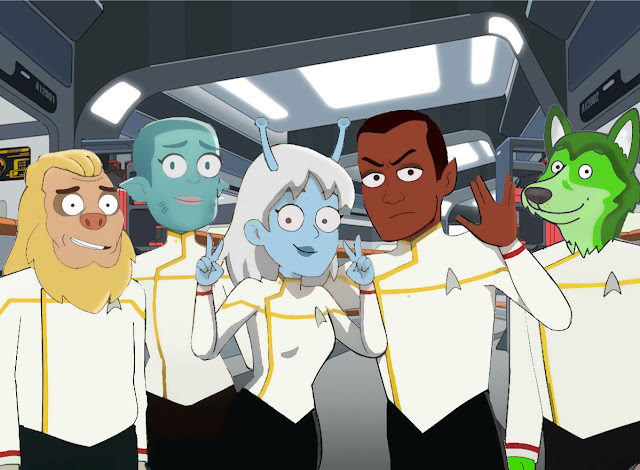Here's a subject I've wanted to discuss again for sometime but I didn't really know where to begin. The hardest part is often figuring out where to start when addressing something as big as this.
Let's talk Immersion and Investment.
Before I get into it, I want to thank Tim Knight of HeroPress for inspiring me to make a new post on Campaign Immersion and for just being a great guy. His supportive comments (partially recently) have helped keep me focus during the particularly chaotic Summer I've had in Real LifeTM. Funny enough, Tim said my posts on Champions have in turn inspired him.
We're looking at an Inspiration Inception here!
In a comment on one of my Kineto posts, Tim Knight wrote:
"As ever, I am so envious of your gaming group and the investment your players put into a campaign (most months, I'm just happy if my players turn up).
Perhaps at some future date you could write a post expanding on this, explaining the benefits of player investment from both the GM's and players' perspective. And maybe offering up suggestions to GMs on how to get their players more invested in a campaign?"
Player and Gamemaster investment in the development and execution of an RPG campaign is always going to give you better results then a lack thereof. This isn't any sort of epiphany. No grand revelation found here. If you and your players care about the game you're running and playing, its going to be a lot better than if you don't.
But what does immersion and investment even mean? What are they in this context?
Defining What We're Talking About
Honestly, I feel it really hard to define. I mean we can define it, I can get some definitions for us; let's see what we have here...OK, how's this: (from the Oxford Dictionary)
Immersion: deep mental involvement.
Hmm.
Investment: an act of devoting time, effort, and/or energy to a particular undertaking with the expectation of a worthwhile result.
Combining those and applying them to the hobby of Tabletop Role Playing Games I'd say that what we're talking about is 'Devoting mental and perhaps emotional energy and effort into your involvement in an RPG character and/or the campaign you're participating in'.
So how do we do this?
There are a number of ways but they are largely surface elements. What do I mean by that? Stay with me...
The Surface of Depth
There are a lot of ways to get people involved and invested in a campaign. It's a good idea to do as many of these as you can as they will all compliment each other. Additionally, different people are inspired and excited by different things. Utilizing a wide array of tools gives the GM and players options; what works for one person might not work for another.
Sights
Art. Art. Art. I can't stress this enough. GM, have an image, miniature, or other visual for that monster, flying castle, or giant robot ready when you introduce it to your players. You don't need a picture of every little thing but you do want one of anything that reinforces the unique look and feel of the particular campaign you are running. Humans are visual beings, we remember things we've seen even more than what we've read or heard. A picture is worth a thousand words.
Maps are especially useful in this regard, even if you don't generally use maps. My campaigns never really require maps but I often make them because - and this is important - Humans are visual! People like maps. Mine almost universally ignore exact distances, latitudes and longitudes, or anything that make up a traditional map. They just look cool and (vital part) help immerse the players in your world. Real places have maps. Real buildings have floorplans. If you have a map, any sort of map, it makes your locations seem more real.
Players, try to find or draw (if you have the ability) an image to represent your character. I highly recommend this. It not only gives the GM and other players a better sense of who your PC is, it help make your character more 'real' to you in a fashion. I've seen it happen many times.
Once, before trying to figure out if his character could squeeze through an opening in a fence or gate, instead of rolling dice a player took one look at his illustration and said, "No way man. Come on! *Laughter* Look at me. I'm huge! This chest and these shoulders aren't getting through a small gap in a fence. No way." The other players looked over at the artwork and nodded. Simple, immersive, and effective.
Sounds
This one works really well for me in some ways, not as well in others but I understand its very helpful for most people.
Cultivate a library of sounds for giving the right feel and atmosphere to your game. This can be a real library of sound effects on a laptop or a practiced array of noises you can make with your voice or objects available to you. It can help immensely to have mastered or have accessible to you a creaking door, phaser fire, rain, the roar of a TIE Fighter, or any number of other noises common to your setting.
Do voices. Please. If you can't or feel you can't than just work on varying the cadence, tone, or or volume of your own voice so not every NPC from friendly barmaid to bloodthirsty pirate sounds like you reading the ingredients off a cereal box. Few things take me out of it more.
Play background music. Give your campaign a soundtrack. Personally I have a lot of trouble with this as I find it mildly distracting but A LOT of friends I've gamed with think its awesome. There have definitely been times I've enjoyed it as well [the volume and timing work out right].
Local Color / Slice of Life
Part of what [I think] creates immersion in my campaigns and the campaigns of those GMs I've enjoyed playing with is the world/setting appearing 'alive' around and independent of the Player Characters. That is to say: NPCs are working in the background, starships are coming and going from the spaceport, animals are grazing in the fields all without any direct impact on the PCs or input from them.
At the same, any PC at anytime can walk over to any background being or beast and talk to them and/or have them react to that PC. They can interact with the environment: the PC can swim or fish in a river, search for salvageable parts among a wreckage, or just sit and enjoy a cup of coffee/tea Earl Grey/steamed blue milk.
The GM creates local color in the form of a living, breathing world around the PCs that acts in a way a world with its particular nature would act. In turn the PCs should consider participating in that world, partaking in slice of life activities that go beyond beating up bad guys and finding lost artifacts. The characters are people living in a place and seeing them as such is a key component of feeling immersed in a game.
Let's go back to my initial question for a moment: How do we do this?
Honestly I have to ask...how do you not? I mean, I understand not everyone does this automatically but I personally don't get why. If you enjoy gaming, are excited about the game you're taking part in, like and connect with your character, and want yourself and everyone else involved to have fun...why wouldn't you invest yourself in the endeavor to the best of your ability? I'm not asking why you aren't going full method actor but c'mon, if you want to participate you've got to give a damn. Right?
If you don't or can't invest/immerse in a game, ask yourself why. Don't feel bad or ashamed by your answers. Pinpointing what's wrong can help you fix the situation.
Do you not enjoy playing this game, story, or even with this group? Maybe you can suggest playing something different. Maybe you can suggest a new storyline. If it's the group, can the difference be rectified? If not, maybe find yourself an alternate crew. You can still be friends with the members of your ol' group even if you don't love gaming with them.
Are you not excited about this particular campaign, setting, or system? I have trouble getting excited over D&D [and its style of Fantasy in general] but sometimes its what my friends want to play so I totally get it. I've tried to play along but I REALLY don't enjoy it. Luckily, I have some very flexible friend who are willing to try a variety of games.
Maybe you don't like your character. Have you considered making a new PC? Talk to your Gamemaster about this and maybe you can figure out what to do about this together. Hopefully there are one or more PC options in the game of choice that you will find interesting. I know from personal experience that this can be quite difficult.
Do you want to have fun and enjoy yourself? Do you want everyone else at the table to do the same? Of course you do, otherwise you wouldn't be playing an interactive game with other people. If the answer is no, maybe your problem is bigger and broader than investing in RPGs. You don't have to live that way. Get some professional help. Seriously. Everyone has the right to be happy.
Part of ones ability to immerse while simultaneously dealing with other players doing the same, each in their own way, can be tricky. If I am taking the setting seriously and another player has a character with a silly name or a pun based gimmick it can sort of take me out it, especially if I let it. I would try to catch myself and try to be more flexible but I might also let the player know and ask them to 'sell me on it' so I can get past my issue. Honestly though, its their character and my problem. Learn to deal. It'll do you and everyone around you a world of good.
Well, that's it for now. I might have more thoughts on this subject in the future but this is good enough for the moment.
What do you think? What do you do to create immersion? How do you deal with a lack of it?
Curious to hear your thoughts.
AD
Barking Alien
Rest in Peace musician, singer, songwriter, and author James 'Jimmy' William Buffett.










